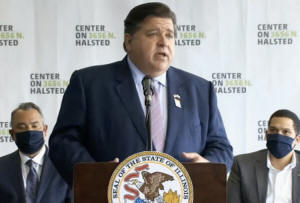Pritzker signs law decriminalizing transmission of HIV
 Send a link to a friend
Send a link to a friend
 [August 03, 2021]
By Andrew Hensel [August 03, 2021]
By Andrew Hensel
(The Center Square) – Gov. J.B. Pritzker
recently signed multiple bills into law intended to help members of the
LGBTQ+ communities in Illinois, including one regarding the transmission
of HIV.
One of the bills that the governor signed was HB 1063, a measure that
repeals the statute creating the offense of criminal transmission of
HIV, according to a summary.
State Rep. Carol Ammons said the old law was not effective. She said
that since 1986, 80 people across the country have been charged with
criminal transmission of HIV.
Pritzker said his signing of this bill will help ensure the safety of
all Illinoisans.
“Today marks another step in Illinois' journey towards a more just and
safe future for all Illinoisans,” Pritzker said.

The governor said the 1986 law that did not help reduce the spread of
HIV.
“Research has shown that this archaic law did not decrease transmission
in the state of Illinois,” Pritzker said. “All this law has done has
created a stigma around the disease.”
Lt. Gov. Juliana Stratton spoke about what this law means for the state
of Illinois.
"These pieces of critical legislation are a commitment to justice,” she
said. “We will continue this important work of ensuring Illinois is an
inclusive state that is safe for members of our LGBTQ community to be
their authentic selves and live free from discrimination.”
[to top of second column]
|

Gov. J.B. Pritzker speaks at an event in Chicago on Tuesday, July
27, 2021.
Courtesy of BlueRoomStream

Stratton also said law rights a wrong from 1986.
“In the spirit of righting wrongs, this legislation makes it clear
of our values and the ongoing work of transforming our state into an
inclusive and equitable state for all.”
Illinois now joins several other states that have changed their laws
regarding the transmission of HIV.
Since 2014, at least five states have modernized their HIV criminal
laws. Some of the changes include removing HIV prevention issues
from the criminal code and including them under disease control
regulations, requiring the intent to transmit, actual HIV
transmission, or providing defenses for taking measures to prevent
transmission such as viral suppression or being noninfectious,
condom use, and partner pre-exposure prophylaxis use, according to
the Centers for Disease Control and Prevention website.
 |